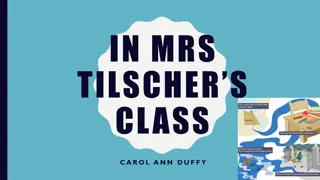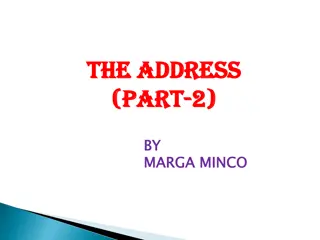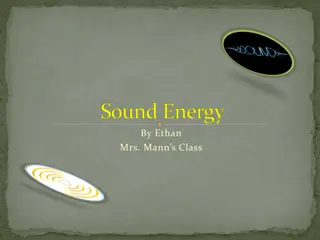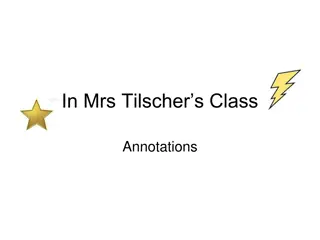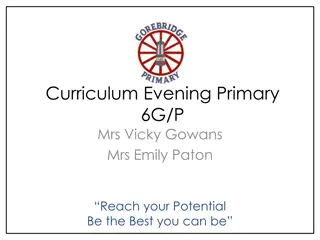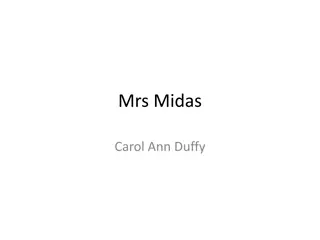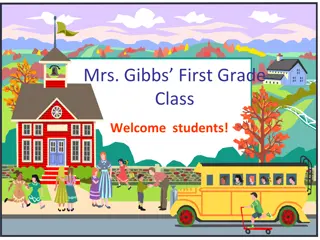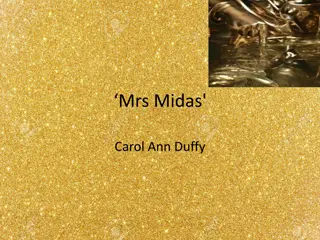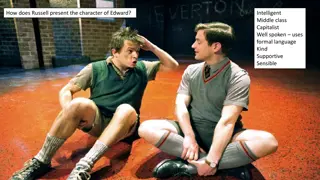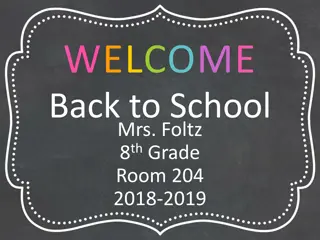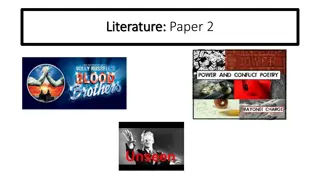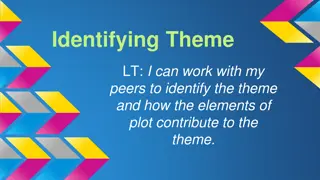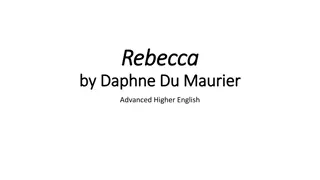Insights into "In Mrs. Tilscher's Class" - Themes, Analysis, and Resources
Explore the themes and analysis of the poem "In Mrs. Tilscher's Class," discussing loss of innocence, emotional change, maturity, nostalgia, uncertainty, and love. Access a range of helpful resources and learning intentions related to the text.
Download Presentation

Please find below an Image/Link to download the presentation.
The content on the website is provided AS IS for your information and personal use only. It may not be sold, licensed, or shared on other websites without obtaining consent from the author. Download presentation by click this link. If you encounter any issues during the download, it is possible that the publisher has removed the file from their server.
E N D
Presentation Transcript
My Blog I will put up all resources we have used, plus any resources I think will be of benefit to you, over the course of the coming year. You should take note of the following URL, and sign up to email alerts that will tell you when I post (if there s an option to subscribe). https://missmcnaughtonsblog.wordpress.com/ If you lose a homework sheet, lose any of the worksheets given to you, or simply want to go over the PPTs, then you will find everything you need here!
Quiz Write down the steps you should take when analysing sentence structure. 1. Identify the technique. 2. Provide evidence (quotation). 3. Explain the purpose of this example of sentence structure (e.g. a comma is used to create a minor pause in a sentence). 4. Explain how this works within the poem what does it suggest/tell us about main themes etc. (This therefore slows the pace of the poem down, enhancing the feeling of stagnancy that the poet feels at this time.) 5. Relate back to the question.
IN MRS TILSCHERS CLASS Higher PPT
Learning Intentions To understand the context of In Mrs Tilscher s Class. To have analysed each stanza. To identify key themes/ideas, and discuss these in relation to the text
Context The poem is based on Duffy s experience of her last year in junior school. By writing in the second person she invites us to share her experience. The poem examines the change that takes place between childhood and adolescence. The safety of Mrs Tilscher s primary school classroom is contrasted with life outside against a background including the Moors Murderers Ian Brady and Myra Hindley. A growing sexual awareness marks the end of innocence. The poem presents a primary school classroom full of interest and happiness. The first two stanzas are full of the excitement felt by children as they learn and discover new facts.
In Pairs: Themes? What themes might we see present within this poem? Do you expect to find any of the themes from Originally or Valentine? Be prepared to explain your selections.
Themes? Loss loss of innocence Change emotional change, Maturity: becoming more mature, leaving childhood behind Nostalgia Uncertainty/confusion about what future holds Time passage of Love
Reading the Poem I will first read through the poem with you. If there are words/phrases that you don t understand, underline them as we read through we can discuss them at the end.
Your Turn Read the poem on your own at least twice. In your jotters, make a note of any key themes or key ideas that you notice. Are any of those chosen the same as those you selected at the beginning? Example: Love
Key Themes Passage of time Loss of innocence Childhood memories/experiences Sexuality Nostalgia Love Safety/Security
Brady and Hindley There is a reference to two names in the poem; Brady and Hindley/ faded, like the faint, uneasy smudge of a mistake./ Mrs Tilscher loved you. Does anyone know who is being referred to here?
Murders that were carried out by Ian Brady and Myra Hindley between July 1963 and October 1965. They took place in and around what is now Greater Manchester, England. The victims were five children aged between 10 and 17 Pauline Reade, John Kilbride, Keith Bennett, Lesley Ann Downey and Edward Evans at least four of whom were sexually assaulted. The murders are so named because two of the victims were discovered in graves dug on Saddleworth Moor. A third grave was discovered on the moor in 1987, more than 20 years after Brady and Hindley's trial in 1966. The body of a fourth victim, Keith Bennett, is also suspected to be buried there, but despite repeated searches it remains undiscovered. The Moors Murders
Moors Murders Reference In the poem, the murderers are referred to by surname alluding to the fact that, as children were the target, there was a palpable sense of unease within society at that time. However the love and nurture that Mrs Tilscher provides is enough to help these children overcome their fears! All very positive don t you agree?
The Title In Mrs Tilcher s Class Prepares the reader for the subject of the poem a school and for the exploration of childhood experiences.
7 minutes to complete! Do Now My brothers cried, one of them bawling Home,/ Home How does the repetition of home develop the theme of loss? (Originally) What is the significance of the blind toy in the first stanza? What does it represent/symbolise? Explain the metaphor It is a moon wrapped in brown paper . Do you think it is effective in conveying the theme of love? Why or why not? (Valentine) In what way is the command Here. powerful? What does it suggest about the speaker s personality? (Valentine)
My Blog I will put up all resources we have used, plus any resources I think will be of benefit to you, over the course of the coming year. You should take note of the following URL, and sign up to email alerts that will tell you when I post (if there s an option to subscribe). https://missmcnaughtonsblog.wordpress.com/ If you lose a homework sheet, lose any of the worksheets given to you, or simply want to go over the PPTs, then you will find everything you need here!
Stanza One In Mrs Tilscher's class You could travel up the Blue Nile with your finger, tracing the route while Mrs Tilscher chanted the scenery. "Tana. Ethiopia. Khartoum. Aswan." That for an hour, then a skittle of milk and the chalky Pyramids rubbed into dust. A window opened with a long pole. The laugh of a bell swung by a running child.
In Pairs Consider Duffy s use of the senses within this stanza. What do their use tell us/suggest about the school environment, and the attitude that the children have towards learning? Have evidence to support your points. Why do you think Duffy lists the scenery that the class are learning about? What effect does it have?
Cannot literally travel refers to the movement of the finger. Introduces a sense of mystery and wonder Mrs T is a magical character that enables students delve into their imagination. Use of personal pronoun You brings reader into the poem, and places Duffy back into the past, as she recalls positive memories of school. The subject matter is universal and invites the reader to remember their own experience of primary school. Enables reader to identify with her experience, drawing them in to the poem. Filled with references to the senses (sight blue , sound chanted ) This lesson is a sensory experience for the speaker, just as the poem will be a sensory experience for us. In Mrs Tilscher's class You could travel up the Blue Nile with your finger, tracing the route while Mrs Tilscher chanted the scenery. "Tana. Ethiopia. Khartoum. Aswan." List = demonstrates enhanced awareness these students have as result of her teaching. Minor sentences evoke teacher dropping foreign names into the young child's imagination so that they will follow her on the adventure of learning conveying sense of wonder and excitement of a young child. Word Choice chanted = soothing effect here, and has connotations of comfort and security. The repetitive chanting creates a world for students that they understand and recognise = they are more comfortable in her presence/learning from her.
List = demonstrates enhanced awareness these students have as result of her teaching. Minor sentences evoke teacher dropping foreign names into the young child's imagination so that they will follow her on the adventure of learning conveying sense of wonder and excitement of a young child. Word Choice chanted = soothing effect here, and has connotations of comfort and security. The repetitive chanting creates a world for students that they understand and recognise = they are more comfortable in her presence/learning from her.
The class has their milk - something all primary children were provided with for free at the time heightens connection 2 poem. Milk = nurturing and wholesome: perhaps the skittle is a symbol of Mrs T s nurturing and wholesome personality. Skittle conveys shape of bottle, but also suggests playing a game = the experience was fun for Duffy. The opening of the window with a pole provides a specific detail of school life that keeps the poem feeling real. Up until now the poem has all taken place in the classroom and the imagination. Here for the first time Duffy suggests the idea of the wider world outside. That for an hour, then a skittle of milk and the chalky Pyramids rubbed into dust. A window opened with a long pole. The laugh of a bell swung by a running child. The lesson on Egypt is literally cleared from the board. Chalky = refers to a classroom of the past, where chalkboards were more readily used. The syntax suggests that the pyramids were real to the child it is not drawings but the real pyramids being dusted off of the board. The word "dust" conveys chalk dust but also implies that to the child they were real. Personification - Laugh of a bell Brings bell to life, representing how full of life/excitement/energy these schoolchildren are. Reflects Duffy s happiness Word Choice energy in "swung" and "running" also establish uplifting and carefree world, where children are free to grow and find themselves within a nurturing setting.
7 minutes to complete! Do Now 1. Why does Duffy use the personal pronoun you in You could travel up the Blue Nile ? What effect does it have? 2. How does the word choice of chanted help to reinforce an atmosphere of safety and security? (Definition + connotations + explanation) 3. Why is personification used in the line The laugh of a bell swung by a running child. ?
Stanza Two This was better than home. Enthralling books. The classroom glowed like a sweet shop. Sugar paper. Coloured shapes. Brady and Hindley faded, like the faint, uneasy smudge of a mistake. Mrs Tilscher loved you. Some mornings, you found she'd left a good gold star by your name. The scent of a pencil slowly, carefully, shaved. A xylophone's nonsense heard from another form.
On your own: 1. What does the short sentence This was better than home suggest about Duffy s mindset/home life? What does she think about her classroom and how do you know this? 2. What technique is used in the lines Brady and Hindley/faded, like the faint, uneasy smudge of a mistake ? Explain its effectiveness. 3. See the example of personification how effective is this in demonstrating how fun Mrs Tilscher s class is. Refer to word choice in your answer.
Short sentence Highlights certainty of childhood, unequivocal belief. Indication of discontent with home life? Short Sentence Provides a snapshot memory. Once more we see how much she enjoyed school it provided her with an enriching environment. Word choice enthralling = connotations of joy and complete absorption perhaps this is also how she feels about Mrs T s teachings. This was better than home. Enthralling books. Juxtaposition of positive, safe, secure classroom and the terrifying and dangerous murderers Brady and Hindley. The reference here is particularly hard hitting as their victims were children. The Moors Murderers' black and white images, which appeared in newspapers, contrast starkly with the colourful sweetshop classroom. The classroom glowed like a sweet shop. Simile Extremely effective as sweetshops are places full of colour and wonder for children; they offer temptation and delight. The comparison therefore suggests that the classroom is full of things to trigger the children's interest and imagination. Sugar paper. Coloured shapes. Brady and Hindley faded, like the faint, uneasy smudge of a mistake. Short Sentences Extend idea of sweetshop image. Duffy creates a listing effect here as if she is documenting the surroundings. These are simple things, but they are enough to transport the child into a magical world, just a Mrs Tilscher listed places along the Nile in Stanza one.
Next Thursday 22nd November Timed question paper. You can use your annotated poems during the paper. It will be on Originally or Valentine. It will have 4x analysis questions and 1x 10 mark question (just like the exam!) I will put up preparatory TA questions on my blog to allow you to practise structuring your answers you may do these/plan these out to prepare. You will get 5 minutes to review your notes, and 45 minutes to complete the paper.
Supported Study: Next Monday We will focus on answering Tone and Effectiveness questions. However, if during your studies you have something you would like to go over prior to the test on Thursday let me know! If anyone wants to come in and study after school during the week, let me know.
Simile Describes effect of child killers Ian Brady and Myra Hindley. Based on the work of a child in the school being erased to correct a mistake. Word choice uneasy smudge something not right. Mistake a childish euphemism for the terrible crime committed by Brady and Hindley. Shows power of this loving environment is such that these figures can almost be wiped away, reduced to a "smudge" on the page. The children in Mrs Tilscher's class cannot be harmed. And yet, she cannot erase evil completely. Its mark is still there on the pages that inform their lives. Despite the horrors surrounding these children, what concerns the child most is the "good gold star left almost as if a fairy had put it there by their name. Reinforces the idea of classroom filled with magic and enrapture. Brady and Hindley Sentence structure. Short and to the point, no question in the child s mind, very childish point of view. Contrast to the horror of Brady and Hindley. faded, like the faint, uneasy smudge of a mistake. Mrs Tilscher loved you. Some mornings, you found she'd left a gold star by your name.
The scent of a pencil slowly, carefully, shaved. A xylophone's nonsense heard from another form. Another sensory line. The adverbs here prolong the line, mimicking the slow act of sharpening a pencil, a universal memory of childhood. Personification A xylophone cannot make nonsense. "nonsense" implies that whoever is playing it is young and hasn t mastered it yet. This is fine, however, as the experience sounds fun and appealing. Yet another snapshot of school life.
Stanza Three Over the Easter term, the inky tadpoles changed from commas into exclamation marks. Three frogs hopped in the playground, freed by a dunce, followed by a line of kids, jumping and croaking away from the lunch queue. A rough boy told you how you were born. You kicked him, but stared at your parents, appalled, when you got back home.
In Pairs: 1. What might the tadpoles changing from commas to exclamation marks represent? Do you notice a discussion of any of the key themes in these lines? 2. It is clear that Duffy is unhappy to hear about the realities of sexual reproduction what words suggest this? Analyse them as appropriate (remember: definition + connotations + what it suggests)
* This stanza introduces the theme of change. It is the Easter term, a time of growth and regeneration. Duffy signals this with the mixed metaphor that links developing frogs to writing/linguistic improvement. Metaphor In keeping with the school setting, but also the move from the insignificant "comma" to the bolder (and taller) "exclamation" skillfully reflects the altered atmosphere within the playground. The exclamation mark also anticipates the shock the child feels when she is told how she was born. The tadpoles suggest sexual reproduction as well as development and growth. protective classroom, but outside learning about the facts of life. Over the Easter term, the inky tadpoles changed Clear indication of the passage of time. Things are moving on. from commas into exclamation marks. Three frogs hopped in the playground, freed by a dunce, followed by a line of kids, jumping and croaking away from the lunch queue. A rough boy Growing children are described through the frogs "jumping and croaking away from the lunch queue Word choice "croaking" could imply their voices breaking. Sentence structure, long and rambling, suggests the long line of children. Instead of gold stars and coloured paper we now have a "dunce" and a "rough boy" taking charge and causing havoc. The feeling is the child narrator is exposed. She is no longer in the
The link with the tadpoles is kept ie birth. A rough boy suggests that this knowledge is unsavoury. Rough = connotations of intimidation, fear, and abrasiveness. The sentence structure, a flat statement, highlights the magnitude of the realisation. A rough boy told you how you were born. You kicked him, but stared at your parents, appalled, when you got back home. Short sentence Evokes her disbelief and perhaps her fear of the unknown. Unwelcome news, the violence suggests horror and/or disgust at this revelation. "appalled - parenthesis places the word in the middle of the line, adding emphasis to her horror as her familiar and safe world disintegrates in front of her eyes. Word choice stared + appalled = how revolted she is by the growing knowledge of sexuality. We see how, as the poem has developed, the passage of time has clearly been marked. Once more the use of the word you involves the reader, suggesting a universal reaction.
Stanza Four That feverish July, the air tasted of electricity. A tangible alarm made you always untidy, hot, fractious under the heavy, sexy sky. You asked her how you were born and Mrs Tilscher smiled then turned away. Reports were handed out. You ran through the gates, impatient to be grown the sky split open into a thunderstorm.
On Your Own: Why do you think enjambment is used over the lines: You asked her/ how you were born and Mrs Tilscher smiled/ then turned away. ? Select at least two examples of word choice. How do these examples demonstrate Duffy s discomfort? (Word + Definition + Connotation + Explanation) Can you identify any of the key themes here? How are they developed?
* We have now reached the summer. School, and this part of childhood is coming to an end. Duffy stresses that the weather is significantly hot. The word "feverish" conveys the flustered, agitated mood. Has connotations of discomfort and stress, implying she is stressed at the prospect of leaving Mrs T s class. That feverish July, the air tasted of electricity. A tangible alarm made you always untidy, hot, fractious under the heavy, sexy sky. The laughing bell from stanza one has become a "tangible alarm This indicates a state of stress and excitement that the child perceives in physical terms. "alarm" also suggests a warning of what is ahead connotations of danger alert reader to this impending change. Metaphor Extends idea of children being agitated/excited. It implies there is a new energy and excitement fuelling the children. Also suggests the threat of lightening and storms (the air symbolises their lives/mood), suggesting the difficult time of adolescence is approaching. Hints at the destructive nature of this new stage of life.
A tangible alarm made you always untidy, hot, fractious under the heavy, sexy sky. You asked her how you were born and Mrs Tilscher smiled then turned away. As she is "always untidy, hot, fractious" - we can infer from this that they are experiencing the beginning of puberty. Word choice hot + fractious = discomfort + restlessness persona is uncomfortable physically and also uncomfortable emotionally with growing up Pathetic fallacy this takes place under a "heavy sexy sky", which suggests that a storm is building. Word choice: "heavy" also suggests the burden of their new knowledge and emotions, while "sexy" refers to their sexual awakening. This time, when the child goes to Mrs Tilscher for help and security it is no longer there. The line break is deliberate here = mimics new division between teacher and pupil. Instead of a magical world, she is given her report. Mrs Tilscher's role has become matter of fact and ordinary. She can t help, she can t guide the persona, persona needs to be independent Note: Pathetic Fallacy = Attributing human feelings/emotions to inanimate things or animals.
Reports were handed out. You ran through the gates, impatient to be grown the sky split open into a thunderstorm. Short Sentence. Reflects urgency students now have desirous to leave. Poem ends with child symbolically running out of the school gates "impatient to be grown". The fear and alarm has translated into an urge to experience life, leaving Mrs Tilscher's classroom behind her. Now they are ready to grow up and face the world, they have left Mrs Tilscher s class to go into the real world Duffy uses pathetic fallacy again to close poem. Illustrates the impact that growing up has on a child it can be full of drama and strong emotions. Implication that there is danger out there beyond Mrs Tilscher's safe haven ( thunderstorm ) and that the child is racing into a world that, despite its excitement, will do little to protect her.
Comparators? In pairs, discuss In Mrs Tilscher s Class, Originally, and Valentine. How do these poems compare? What key issues/themes/ideas do they share?
This poem would pair best with Originally as both explore childhood and growing up. While In Mrs Tilscher's Class focusses on the joy of primary school that is closely followed by adolescence, Originally looks at the impact of physically moving country as a child and having to fit in as well as moving from childhood into adulthood. Contrast in O + Mrs T: In O she was forced out and consequently suffers negative emotions/reactions. In Mrs T she feels ready to leave resulting in positive emotions. Both also deal with powerful childhood memories. In terms of language to conjure place, the use of senses and the portrayal of character, you could also pair it with almost all of the other poems.
Common Themes Love, Experience, Change, Movement of Time, Use of contrast (ideas), Loss
Questions 1. Through discussion of poetic techniques, explain how Duffy uses childhood experience to demonstrate the theme of change. (4 marks) 2. Explain how effective you find the final stanza as a conclusion to the main ideas of the poem. You should refer to at least two examples of language in your response. (4 marks) 3. There is a nostalgic tone that permeates this poem. Explain how Duffy develops this tone, in relation to the main ideas of the text. (2 marks)






